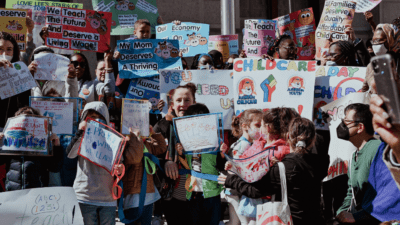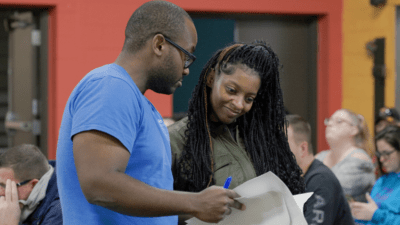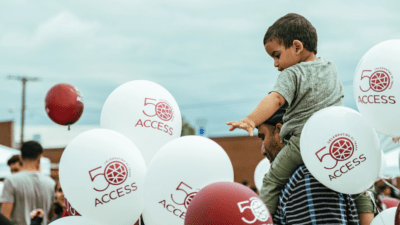I was born and raised in poverty. As a Latina/Mexican growing up in South Los Angeles, the systematic barriers to a good life were real, and despite having a loving mother, I ended up in the foster care system at an early age. Sadly though, about half of the kids who go through foster care end up in prison – just like I did.
My children were five and 10 years old, and I was six months pregnant with my son when I was sentenced. I knew that I had to change my life while I was inside and use those three years to prepare myself to support my young children when I got home. But without any money to get on my feet again, I didn’t know how I was going to do that.
While I was incarcerated, I learned about a program called the Returning Citizens Stimulus (RCS), an initiative formed by the Center for Employment Opportunities (CEO) that put cash in the hands of people being released from prison, allowing them to purchase necessities like food and clothes. I’d first connected with CEO while attending a job course inside prison, so I contacted them seeking help with reentry cash.
Because of CEO and RCS, I was given $2,500 in cash after my release over three payments over three months. This reentry cash assistance was crucial to my successful transition back into my community. If it wasn’t for this money, I honestly don’t know how I would have survived my first few months out.
To continue this work, CEO helped launch the Coalition for Reentry Cash, which brings together both justice-impacted individuals and reentry service providers to elevate the conversation around cash transfers, and to advocate for reentry cash as a powerful policy solution to the broken reentry process.
The first 72 hours after release from prison are critical. By this time, they are likely already experiencing food insecurity. We know from the first RCS evaluation that participants reported that the program helped with their financial stability in the months following release, and most said that they spent the RCS funds on essential expenses like rent, food, and to prepare themselves for employment.
More recently, this long-term evaluation shows that CEO’s RCS participants were 38% more likely to be placed in permanent employment and 84% more likely to maintain employment one year after their initial job placement.
I grew up poor, and studies show that people living in poverty are more likely to be rearrested because of decreased opportunities. By directly confronting the poverty that underlies many cases of recidivism, we can promote public safety and economic growth. Current evaluations demonstrate that reentry cash can better guarantee successful reintegration following incarceration. And to help the public understand, CEO created video stories to be featured in the national rollout of their new coalition website – reentrycash.org.
After my release, I came to CEO as a participant and then joined their Advocacy Leadership Committee and learned how to use my story to build bridges with politicians and inspire policymakers. Soon, CEO awarded me an Advocacy Fellowship, an advanced leadership program where select people represent the organization externally while learning skills in public policy and organizing – all necessary for a career in the social sector. I testified before the state legislature, and our advocacy was vital to the successful passage of a landmark appropriation in the 2022 state budget, a $50 million investment in reentry services and cash assistance.
The training allowed me to find my true passion. I am now working for CEO as an Organizing Associate, bringing this leadership training to other participants. I am making an impact on policy by telling my story and developing skills for my career. And being able to show my kids that their mother can overcome anything in the world gives them the motivation to continue pushing themselves to achieve their dreams.
![]()
I am proud to say that this work would not have been possible without the support CEO has gotten from the W.K. Kellogg Foundation to conduct the evaluation and share the stories of impact from the Returning Citizen Stimulus. Thanks to this partnership, we are able to change the narrative of what it means to return home from incarceration, and how much meaningful financial resources in reentry can be life-changing for people.
Karina Melendez is of Latina/Mexican descent and was born and raised in South Los Angeles, California in a gangland surrounded by poverty. Despite being raised by a loving single mom, she fought her way through the foster care system and had to learn to take care of herself at a very young age. Kari first connected with the Center for Employment Opportunities (CEO) while attending a job course inside prison, building her resume and preparing for her future when she went home. Karina enrolled in CEO as a participant when she was released, where she engaged in transitional work and job coaching services. Returning to society and having to prove herself was a struggle, but working for CEO was crucial because Kari had three children who were dependent on her, and had lost everything during incarceration. During this period she was enrolled in an advocacy leadership & training course, and learned how to use her inspiring story to build bridges with politicians and policymakers. Straight out of the course, Kari was tapped for the statewide Advocacy Fellowship, an advanced leadership program. Kari’s dedication was palpable – and after completing the fellowship, she was hired full-time as an Organizing Program Associate and takes pride in facilitating the very same workshops that inspired her to pursue advocacy as a career. She is also a key spokesperson for the Coalition for Reentry Cash – a national effort to implement guaranteed income to people returning from incarceration, and holds a Certificate in Social Justice and Community Organizing from the University of Michigan School of Social Work.








Comments